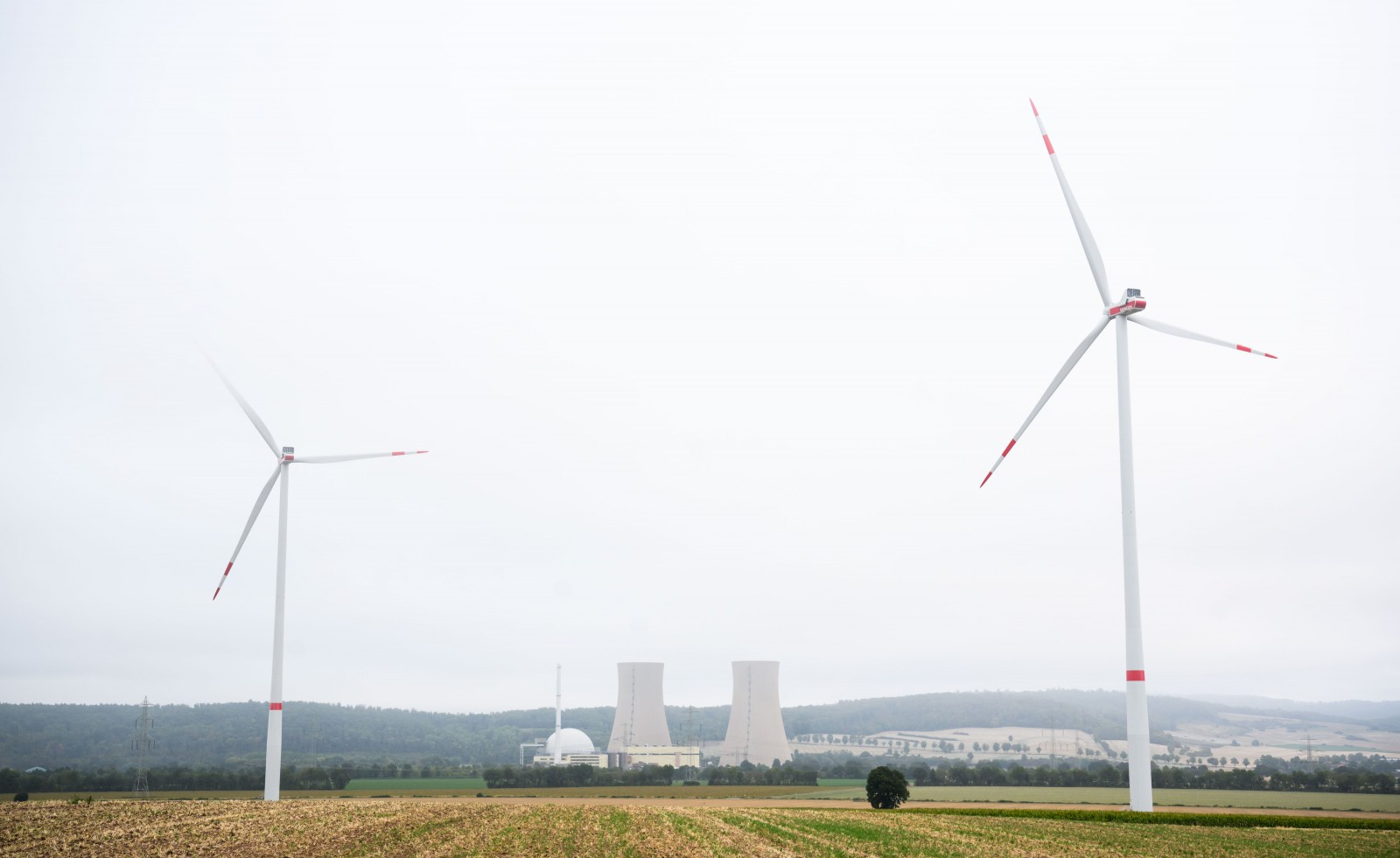Share post now
Article
Is the greenwashing fog about to clear?
30.09.2022, Finance and tax policy
In late May, public prosecutors in Frankfurt searched the offices of Deutsche Bank and its asset management subsidiary DWS. The reason was presumed greenwashing practices. Time to ensure greater clarity in also Switzerland.

Wind turbines near the decommissioned nuclear power plant Grohnde, Lower Saxony. – The European Union wants to label investments in nuclear energy as "green", environmental organisations criticise this sharply.
© Foto: KEYSTONE / DPA / Julian Stratenschulte
Greenwashing accusations against DWS have been rife for months now. The specific accusation is that asset managers have been exaggerating the sustainability of DWS products as regards environmental protection and climate change. According to the Public Prosecutor's Office, sufficient evidence has been found to show that ESG criteria (environment, social, governance) are being observed only for a fraction of investments.
Last year, the US Securities and Exchange Commission (SEC) and the German Federal Financial Oversight Authority (BaFin) launched separate investigations into allegations by a whistleblower that DWS was selling its funds as more environment-friendly than they in fact were. The greenwashing allegations that came to light in August sent DWS shares plunging by more than 20 per cent, and precipitated the resignation of CEO Asoka Wöhrmann.
And what is the situation in Switzerland?
This case was viewed as a shot across the bow of the entire finance industry, which is under regular suspicion of engaging in greenwashing practices. Here in Switzerland too, the Swiss Financial Market Supervisory Authority (FINMA) is now taking an interest in communication relating to financial products: it now conducts more inspections in an effort to combat misleading advertising with "green" promises.
Recent years have witnessed a substantial rise in demand from clients and investors for sustainable financial products and services – coupled with the danger that clients and investors could be deceived about the supposed sustainable properties of financial products and services (financial products labelled "sustainable", "green" or "ESG").[1] Greenwashing is the term applied when customers of financial institutions are knowingly or unknowingly deceived or given misleading information about the sustainable properties of financial products.
FINMA's tasks include protecting financial market clients and investors from improper business practices, especially deception. FINMA investigations have now produced clear evidence of greenwashing practices in the sale of financial products and services, and determined that providers often make "vague to misleading promises" about their products.
To counter the risk, transparency around sustainability must be enhanced as a matter of urgency, by introducing standardised requirements and indicators, classifications (taxonomy) and methods for gauging the positive and negative impacts of investments on the climate and on sustainable development. Under the Paris Climate Agreement, Switzerland assumed commitments that also apply to its financial centre.
No specific legislative basis
There are currently no specific transparency-related provisions governing products and services that are described as "sustainable". Only general rules apply, including the prohibition of deceptive practices in connection with collective investment schemes (investment funds). Investors should be in a position to make well-founded investment decisions, including in the cases of products declared as "sustainable". FINMA published guidelines in November 2021, laying out the information that Swiss funds must provide in the documentation when they are declared as sustainable. When applying for authorisation, those funds are required to supply additional information as to the sustainability goals being pursued, their implementation and the expected impacts. This enables FINMA to better assess whether there is deception and to take appropriate action.[2]
Despite this, FINMA has only limited leeway for effectively preventing and combatting greenwashing. There are no specific sustainability-related transparency obligations and effective control parameters on which basis to take measures. Only additional regulatory measures would provide FINMA with the tools it needs to be able to combat greenwashing more comprehensively and effectively.
Let us not forget the Federal Council’s announcement, in late 2021, of its intention to make Switzerland a market leader in sustainable financing. At the time it urged financial market players to strive for enhanced transparency by introducing comparable and meaningful climate compatibility indicators that would enable investors to classify and select investments according to their impacts on the climate. In that context, the Council unveiled “Swiss Climate Scores" in late June, and recommended their use by financial market players purely on a voluntary basis.
By the end of 2022, the Swiss Federal Departments of Finance and the Environment (FDF and DETEC) are expected to produce a report on the implementation of these recommendations by the financial sector and – in conjunction with the FINMA – to table concrete suggestions on changes that are needed to financial market legislation in order to avoid greenwashing.
Considering the significance of the Swiss financial centre, the Federal Council would be well advised to bring forward an ambitious and future-ready regulatory framework which, at the very least, incorporates the relevant EU regulations. This could curb greenwashing practices so that financial flows from Switzerland could be credibly and measurably redirected – for the benefit of the climate and sustainable development.
[1]In 2020, "sustainable" funds grew by 50 per cent and their cumulative volume surpassed that of "unsustainable" funds for the first time.
[2]Among the practices covered by the term greenwashing, FINMA mentions collective investment schemes that purport to be sustainable when in reality no sustainable investment policy or strategy is being pursued, or collective investment schemes that use terms like "impact" or "carbon-neutral" to suggest sustainability, in the absence of any means of measuring or verifying the resulting impacts or savings.
